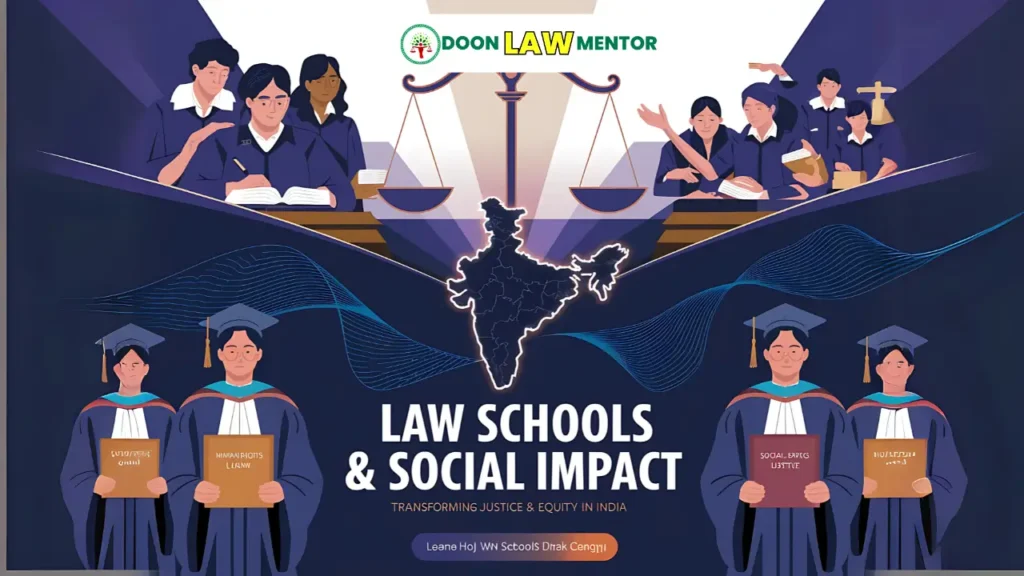Role of law schools in social impact extends beyond academic excellence, driving social justice and equity in India. This blog explores how law schools empower students, influence public policy, and contribute to nation-building through legal aid clinics and advocacy
Law schools play a pivotal role in shaping the legal professionals of tomorrow, but their influence extends far beyond the courtroom. In India, where social justice, equality, and development remain pressing concerns, law schools serve as critical agents of social impact. By fostering awareness, advocacy, and actionable solutions, these institutions contribute significantly to nation-building.
This blog explores how law schools in India contribute to social impact, the challenges they face, and their evolving role in promoting justice, equity, and societal progress.
Table of Contents
Introduction
Role of law schools is very important as far as social impact is concerned.Law schools are not just academic institutions; they are incubators of thought leaders, change-makers, and advocates for justice. In a diverse and dynamic country like India, the role of law schools in driving social impact cannot be overstated. From offering free legal aid to marginalized communities to influencing public policy, these institutions are at the forefront of societal change.
By focusing on legal education that emphasizes ethical practice and social responsibility, law schools empower students to tackle pressing issues such as inequality, corruption, and environmental degradation.
The Intersection of Legal Education and Social Impact
Legal education in India is increasingly being recognized as a tool for social transformation. The intersection of law and social impact is evident in the way law schools:
- Empower Students: By providing knowledge and tools to address social injustices.
- Build Awareness: Through seminars, workshops, and public campaigns that educate communities about their rights.
- Shape Policy: Research centers within law schools contribute to policy-making processes by producing evidence-based recommendations.
Legal Aid Clinics: Bridging the Access to Justice Gap
Legal aid clinics, often run by law schools, are vital in bridging the access to justice gap in India. These clinics:
1. Provide Free Legal Assistance
- Offer pro bono legal services to underprivileged individuals who cannot afford professional representation.
- Handle cases related to domestic violence, labor disputes, land rights, and more.
2. Promote Experiential Learning
- Enable law students to gain hands-on experience by working on real cases under the supervision of faculty and practicing lawyers.
3. Empower Communities
- Conduct awareness drives and legal literacy programs to educate communities about their legal rights and remedies.
An example is the National Law School of India University (NLSIU), which operates legal aid clinics addressing issues ranging from child rights to consumer disputes.
Research and Policy Advocacy
Law schools in India play a significant role in shaping public policy through:
1. Academic Research
- Research centers at institutions like Jindal Global Law School (JGLS) and National Academy of Legal Studies and Research (NALSAR) focus on pressing issues like human rights, climate change, and constitutional law.
2. Policy Recommendations
- Collaborate with governments and NGOs to provide recommendations that influence legislation and policy-making.
3. Hosting Dialogues
- Organize conferences and symposiums where policymakers, academics, and activists discuss contemporary issues and solutions.
Incorporating Social Justice into Curriculum
To drive meaningful social impact, law schools are integrating social justice themes into their curricula. Key elements include:
1. Mandatory Courses
- Courses on human rights law, environmental law, and public interest lawyering.
2. Case Studies
- Encouraging students to analyze landmark cases that have had significant social implications, such as Kesavananda Bharati vs. State of Kerala and Vishaka vs. State of Rajasthan.
3. Internships with Social Organizations
- Partnering with NGOs and social enterprises to provide students with practical exposure.
Promoting Public Interest Lawyering
Public interest lawyering, which focuses on representing marginalized and underserved groups, is a growing focus area for Indian law schools. Institutions promote this by:
- Encouraging Pro Bono Work: Through student-run initiatives and collaborations with legal aid societies.
- Hosting Moot Court Competitions: On themes like human rights and public policy to instill a sense of responsibility among students.
- Providing Scholarships: For students interested in pursuing careers in public interest law.
Challenges Faced by Law Schools in Driving Social Impact
While law schools in India contribute significantly to social impact, they face several challenges, including:
1. Limited Funding
- Many law schools lack the financial resources needed to run extensive legal aid programs or research initiatives.
2. Lack of Awareness
- Students often prioritize corporate law careers over social justice roles due to limited exposure and incentives.
3. Regulatory Constraints
- Bureaucratic hurdles and lack of autonomy often restrict innovation in curricula and outreach programs.
Case Studies: Law Schools Making a Difference
1. NLSIU’s Legal Services Clinic
- Provides free legal aid to underserved communities in Bengaluru.
- Focuses on empowering women, children, and laborers.
2. JGLS’s Center for Human Rights Studies
- Conducts impactful research on issues like human trafficking and refugee rights.
- Collaborates with international organizations to advocate for policy changes.
3. NALSAR’s Environmental Law Initiative
- Works on climate justice and sustainable development projects.
- Engages students in environmental litigation and advocacy.
Future Directions for Law Schools
To enhance their social impact, law schools in India must:
- Expand Access: By offering scholarships and fellowships to underprivileged students.
- Leverage Technology: Use digital platforms to expand the reach of legal aid clinics.
- Forge Partnerships: Collaborate with international law schools, NGOs, and government bodies to address global challenges.
- Promote Interdisciplinary Learning: Integrate legal education with fields like sociology, political science, and technology.
FAQs
1. How do law schools contribute to social justice in India?
Law schools contribute through legal aid clinics, policy advocacy, and promoting public interest lawyering, addressing issues like inequality and human rights violations.
2. What are legal aid clinics?
Legal aid clinics are student-run initiatives providing free legal services to marginalized communities, often under the supervision of faculty.
3. How can law schools promote public interest lawyering?
They can encourage pro bono work, offer scholarships for social justice careers, and organize competitions focusing on public interest themes.
4. What challenges do Indian law schools face in driving social impact?
Key challenges include limited funding, lack of awareness among students, and regulatory constraints on curricula and programs.
5. How do law schools influence public policy?
Through research centers, policy recommendations, and collaborations with governments and NGOs, law schools shape legislation and reforms.
6. What is the future of law schools in promoting social impact?
The future lies in expanding access, leveraging technology, forging global partnerships, and integrating interdisciplinary learning to address complex social issues.
Conclusion
Law schools in India are uniquely positioned to drive social impact by fostering a culture of justice, equity, and inclusivity. Through legal aid clinics, research initiatives, and public interest lawyering, these institutions not only empower students but also serve society at large. By overcoming existing challenges and embracing innovation, law schools can continue to be powerful catalysts for social transformation in India.
#LegalEducation #SocialImpact #LawSchoolsIndia #PublicInterestLaw #LegalAidClinics #DoonLawMentor







